PropTech Market Trends in 2024

Since the beginning of the 2000s, digitization has inevitably changed almost all areas of our lives. The real estate industry was no exception. Proptech (aka property technology) has been one of the most popular areas for investment over the past decade. Solutions developed by proptech companies make life easier for developers, real estate agents, brokers, tenants and landlords, and other real estate professionals.
However, you may be wondering — what are the predictions regarding the future of proptech (especially after the coronavirus pandemic and potential financial crisis looming over the world)? What specific solutions are considered to be part of proptech and what are the types of software for real estate? What directions and trends are there now in proptech? What to expect in 2024 for this industry?
This article will give you answers to all of these questions, give you valuable proptech insights, and show the possible future of real estate technology.
What is PropTech?
PropTech, or Property Technology, refers to real estate startups that use new technologies and innovations to streamline the traditional processes of the industry. PropTech uses technology to enhance every aspect of real estate.
There are several distinct areas under the PropTech umbrella. For example, ‘ConTech’ relates to the use of new technologies to improve construction processes. Real estate tech startups building new, ‘smart’ buildings and cities are referred to as ‘Smart Real Estate’, and ‘Real Estate FinTech’ describes financial technology startups that provide innovative solutions for streamlining the financial processes of real estate.
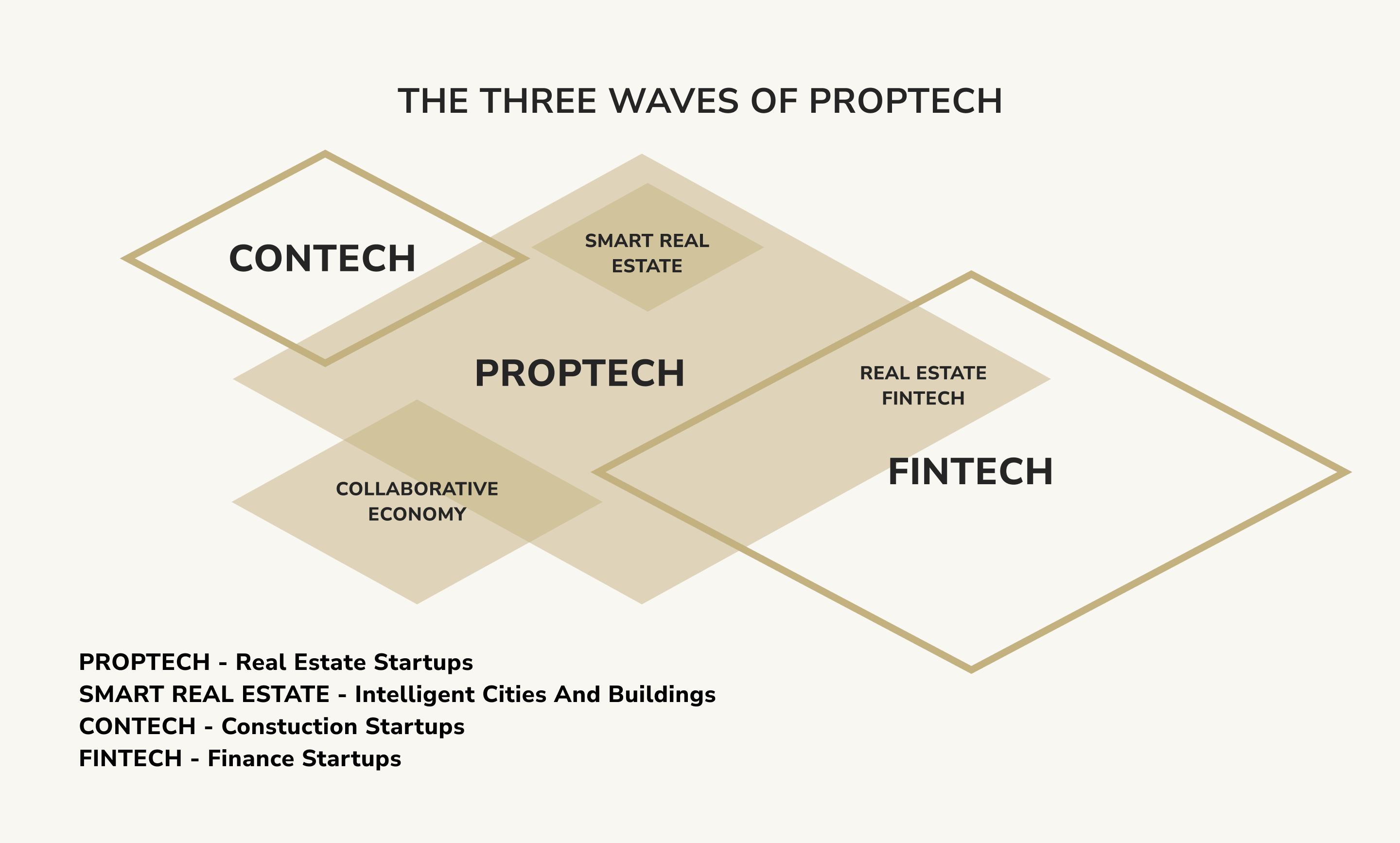
The Three Waves of PropTech
PropTech has developed in three waves over the years. The first wave began in the 1980s when computers first came into commercial use, allowing businesses to collect customer data. Software packages and programs were released that catered to the needs of various business models, real estate included.
At the beginning of this period, Microsoft Excel was the program of choice. Agencies were able to collect, store, and analyze customer and property data using Excel, but the market quickly turned to proptech sowtfare development, which created products that were specific to real estate. The focus at this time was on providing systems to help agents perform analytics and underwriting better, and the emergence of new products in this area opened the door to a new real estate business format.
The second wave, which made an appearance in the early 2000s, skyrocketed the use of PropTech as the use of the internet to search for anything and everything became the norm. Technology companies with a specific focus on real estate (called proptech companies) began to emerge, including for example Redfin and Trulia. Suddenly real estate tech (or PropTech) was an entire niche of its own.
The property market is now entering the third wave of PropTech, undoubtedly sped up by the challenges to the industry that COVID-19 has presented. In this third wave, the proptech market map has changed; we see innovative digital systems and applications that enable investors and agents to conclude deals without meeting in person. With the proptech market size growing each year and the list of proptech companies updating daily, third-wave PropTech goes beyond online services to also include VR, AR, drones, and the IoT, for example.
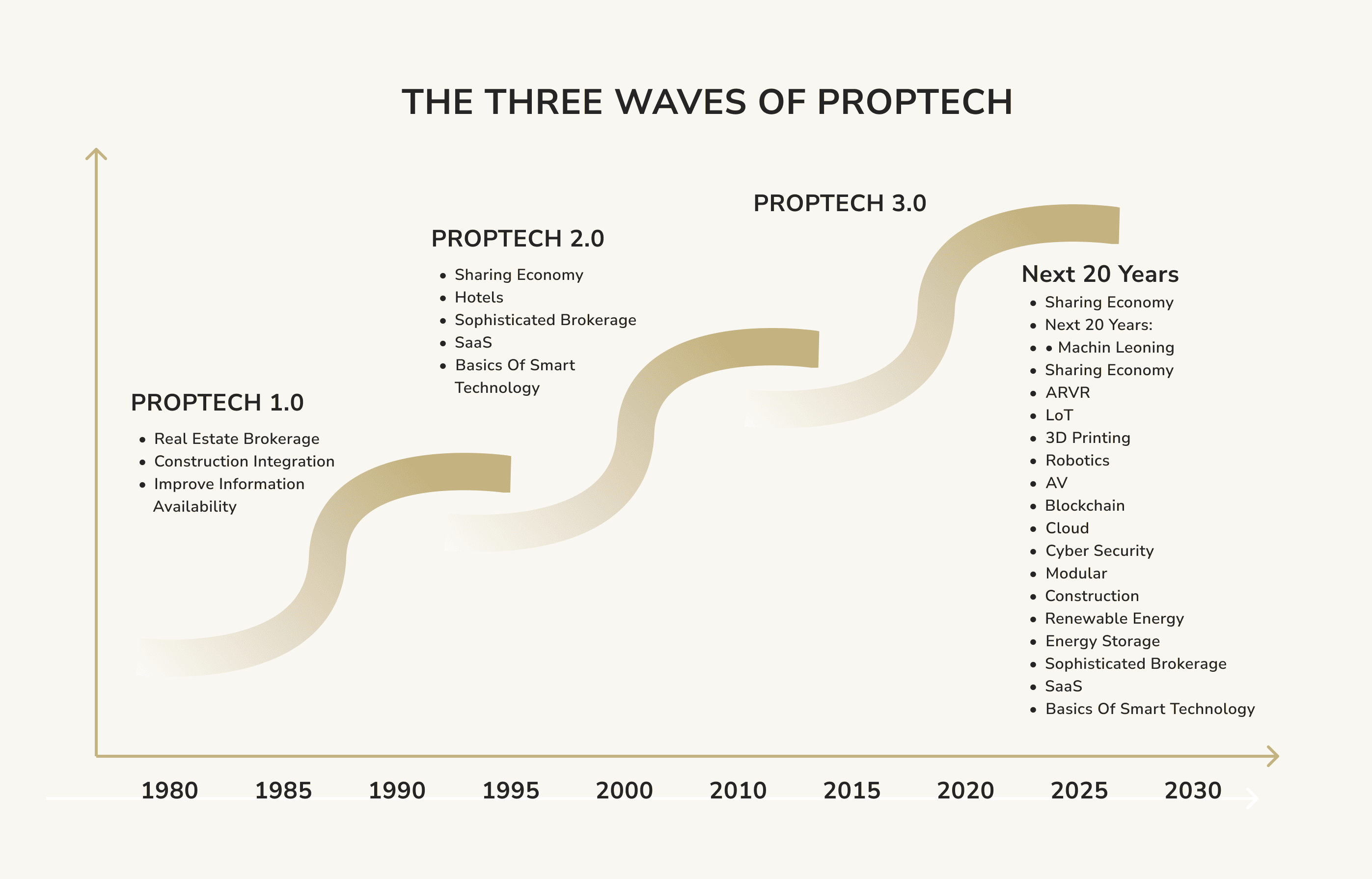
The PropTech Industry Today
The PropTech industry has come a long way since its first wave. Today, Proptech funds are at an all-time high according to CB Insights, and the real estate tech sector gains more traction each year. There has never been a better time for real estate businesses to invest in PropTech.
But let's look at proptech statistics to prove our point. Research shows that “The global PropTech market size was worth around $19.5 billion in 2022 and is predicted to grow to around $32.2 billion by 2030…” Another research as of the middle of 2023 claims that 43% of investors expected to make more proptech investments.
However, it is worth noting that Brandan Wallace from the venture capital firm Fifth Wall claims that the leaders in the sector have to be prepared for a slowdown across the real estate capital market as well as the tech capital market after the investment boom of 2021-2022.
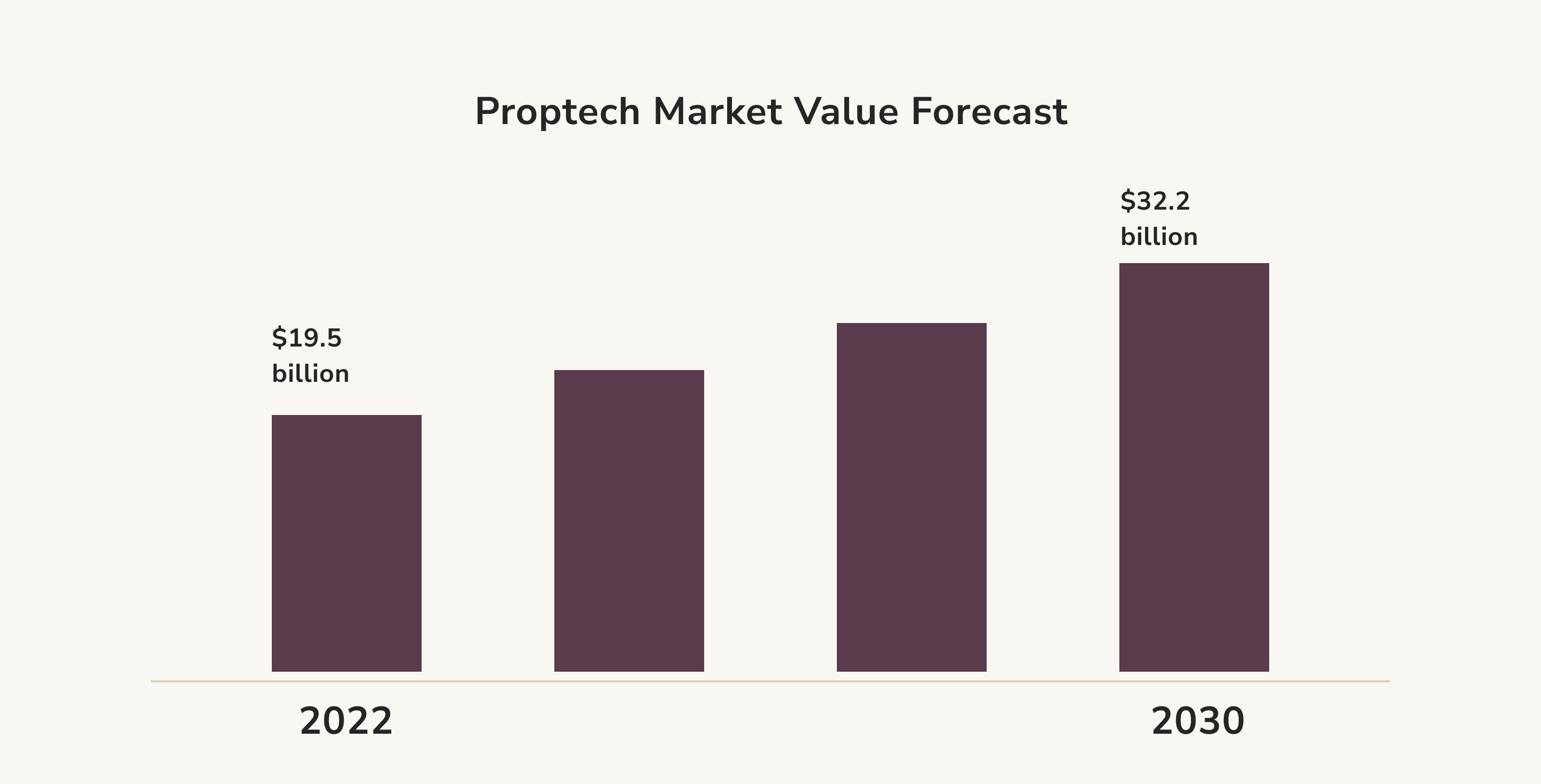
To take maximum advantage of this trend, startups must know how to capitalize on PropTech and understand how emerging technologies can overcome the challenges of the property industry.
This brings us to our next section.
The Benefits of PropTech in Overcoming Real Estate Challenges
PropTech offers real estate startups many benefits and can easily overcome traditional areas of challenge, as detailed in the list below:
Investing
Investing in commercial property for profit is becoming increasingly popular, but it can be time-consuming to investigate and shortlist property options.
Commercial property comparison online saves both time and money by enabling investors to thoroughly investigate property options before creating a shortlist. Some examples of this are 42Floors, CIMLS, and LoopNet.
Construction
Risks and losses are caused by failures in planning, forecasting, and estimating costs.
The need for manual or in-person meetings to provide updates can slow the project down.
Collaborators can use special PropTech app to communicate and share information on a single easy-to-use platform, from initial conceptualizers to the final builders. The need for in-person meetings is eliminated, and efficient team-wide collaboration ensures that construction projects are completed to specification in less time.
Purchasing and Renting
The property-hunting process can be arduous and traditional search engines turn up many unsuitable results.
PropTech apps and programs allow agents and investors to set custom parameters such as location, property features, and price tag to filter out unsuitable results and only present options most likely to meet the investor’s needs. A prime example of PropTech used in this way is Airbnb.
Coworking
The use of coworking spaces is becoming increasingly popular.
Owners, agents, and managers of coworking spaces significantly benefit from using real estate technology tools. For instance, OfficeRnD can help them to keep track of memberships and payments, integrate marketing systems, and track customers.
Data Management
Gathering, storing, and interpreting data requires significant resources and can easily result in inaccuracies.
PropTech helps with gathering and interpreting data accurately. PropTech makes it easier to keep track of investor interest and simplifies the management of rental and sale properties.
In all of these areas, PropTech reduces overheads and allows agencies to cut back on spending. Customers receive digital/virtual services, and agents can work on the go. As a result, productivity and profits increase.
Types of Real Estate Sectors You Need to Know to Succeed
Each real estate niche has specific software requirements. It is important to consider your property niche when looking into real estate software solutions. Nevertheless, PropTech startups benefit from an awareness of the wider real estate industry.
Types of real estate businesses exist within several sectors of the industry. Each sector has its own role and uses PropTech in different ways.
Development
Developers buy land for rezoning and construction. On completion of the project, the property is sold or leased. Startups in development earn profits by increasing the land value and then selling it for a profit.
Developers use PropTech to keep track of construction. It helps collaborators to work, share, and update the project in real time without any need for face-to-face meetings.
Brokerage
A real estate brokerage is a firm that hires estate agents to work under their company name. Agents facilitate the sale, purchase, rental, and management of the property.
Brokerages use PropTech software for real estate professionals to communicate with agents digitally and for property presentations. PropTech also helps to keep track of properties and existing/potential clients by collecting and managing data.
Sales and Marketing
Sales and marketing firms and agents work with developers to handle the sale of newly-developed properties. Their services include marketing, advertising, and facilitating the final deal. This simplifies the process for developers.
Real estate sales and marketing professionals use real estate business software to stay on top of development progress. It is also ideal for presenting properties to potential clients, marketing properties, and analyzing market data.
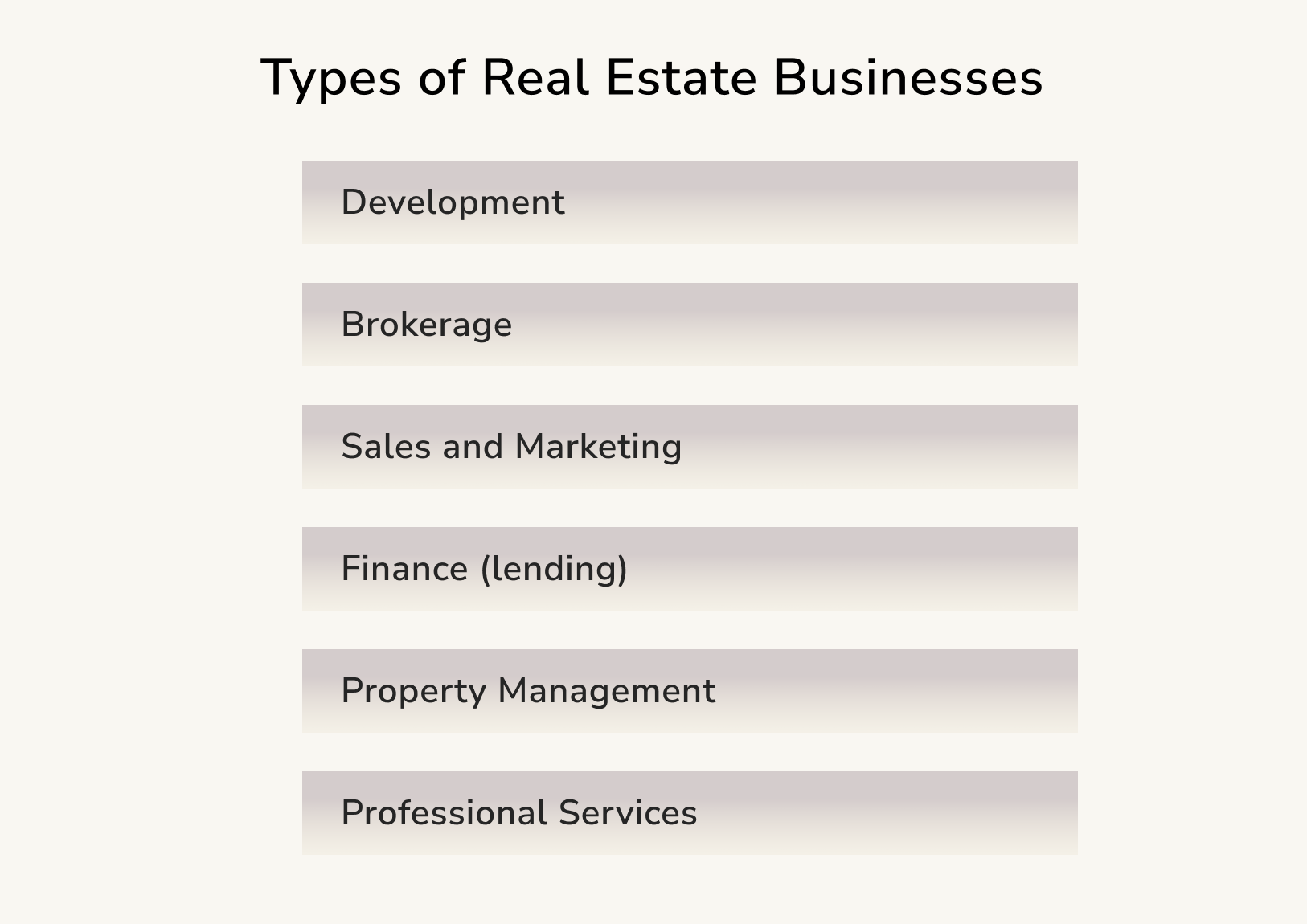
Finance (lending)
Lending companies such as banks, credit unions and government institutions make up a large part of the real estate market. This is because most individuals and businesses finance the purchase of their properties.
Lenders can use specialized online real estate software that uses machine learning techniques and algorithms to determine property investors’ creditworthiness.
Property Management
Property managers help owners manage the rental of their units. They use real estate agent management software to keep control over tenant issues. The software also helps to manage repairs, rent collection, advertising, and property presentations.
Professional Services
Without professional services, the real estate industry would come to a grinding halt. Lawyers, accountants, property stagers, interior designers, contractors, and construction workers all use PropTech to simplify and enhance their role in the real estate industry. For instance, a property stager can use VR to help clients envision their lives in a new property.
Now that we have taken note of the main areas of real estate business, what types of real estate software are commonly available?
Four Main Types of Real Estate Software
There are four main types of real estate success software products on the market. These are Real Estate Agent Management Software, Customer Relational Management Software, AV/VR Real Estate Software, and Enterprise Resource Planning Software.
Real Estate Agent Management Software
Real Estate Agent Management Software streamlines the daily tasks essential to property management. These tasks include accounting, rent payment tracking, tenant correspondence, and maintaining tenant legal compliance records.
Top proptech companies that offer this type of software include Buildium, which is ideal for accounting tasks, and TurboTenant, which is suitable for tenant screening, marketing, and general management.
Customer Relational Management Software (CRM)
Customer Relational Management Software (CRM) facilitates relationships between agents and clients. It allows for concise data management and lead nurturing, and can be used to alert potential customers of offers, deals, and property sales. It’s also ideal for efficient contract management.
CRM PropTech products that are currently trending and will continue to do so in 2024 include Propertybase and Wise Agent.
AV/VR Real Estate Software
AV/VR Real Estate Software uses Augmented Reality (AR) and Virtual Reality (VR) to visualize property without the need to be there in person. AR superimposes objects onto actual surroundings, whereas VR is about immersing oneself in a virtual world.
There are other uses too. VR software helps investors to envision what an as-yet undeveloped property will look like after construction. AR can allow potential buyers to virtually arrange their furniture in a home to check the fit and imagine living there.
One effective case of a VR system used in real estate is the Occulus Rift experience. For AR, the Amazon AR View service is a great example.
Enterprise Resource Planning Software
Enterprise Resource Planning Software is ideal for managing the daily activities of a real estate business, such as accounting tasks, project tracking, and risk management. Brokerages also use this software to visualize their business’s overall performance and gain insights that keep them on top of their game.
Two good examples of Enterprise Resource Planning Software that are currently trending in the real estate industry are BrokerMint and Deskera.
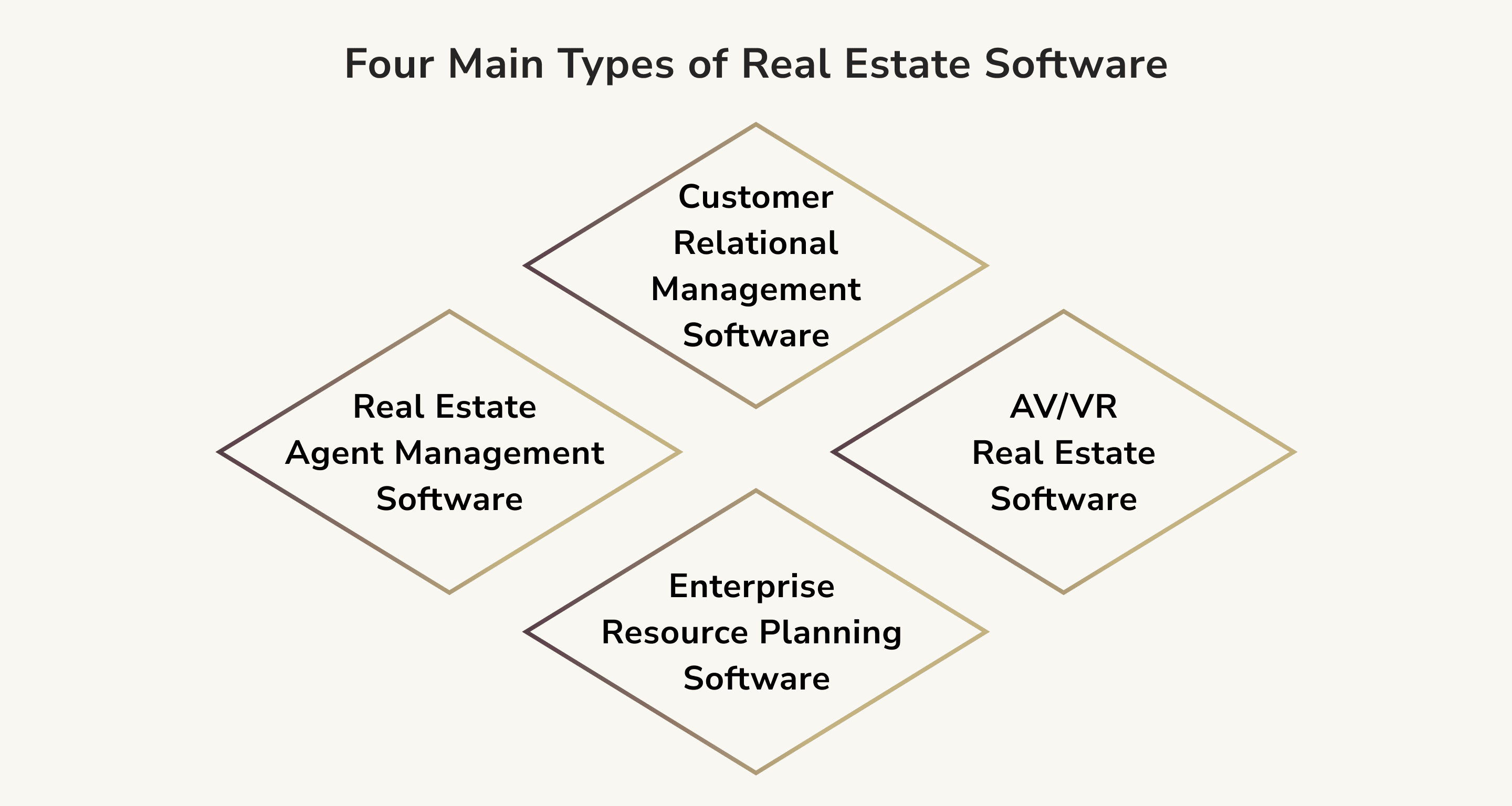
Real Estate Technology Trends in 2024
Several trends in proptech have emerged in recent years and these commercial real estate tech trends are driving PropTech growth. The nine main real estate trending topics seen this year at the proptech conferences, discussed on all proptech podcasts and mentioned in any proptech blog are:
- Artificial Intelligence and Machine Learning
- Virtual Reality
- Internet of Things
- Drones
- Big Data and Digitalization
- Sustainability Technology and Green Construction
- CRM Software or Custom CRM Development
- Cloud Computing
- Blockchain
- Green Construction
We will consider each of these main drivers/proptech trends in more detail below.
Artificial Intelligence and Machine Learning
Artificial Intelligence (AI) is the intelligence portrayed by machines. Machine learning is a subset of AI that involves providing machines with data, which helps the machine ‘learn’ to respond in a particular way. AI is popular because it automates otherwise time-consuming and repetitive tasks.
HouseCanary and Localize.city are two trending AI proptech apps in the industry today.
Using AI and machine learning for real estate purposes gives many benefits. Some of the biggest benefits include:
- AI simplifies large property management tasks and streamlines data management.
- AI can recognize customer preferences and make suggestions.
- Advertising campaigns can be fine-tuned with input from artificial intelligence real estate products.
- Machine learning real estate software generates actionable insights by identifying patterns.
- Chatbots can provide 24/7 customer service availability.
Virtual Reality
Virtual Reality (VR) is the use of technology to immerse oneself in a simulated environment. In most instances, headsets are used. VR provides prospective buyers, renters, and investors with a virtual property tour with no need to visit the actual property. EYESPY360 and iStaging are PropTech VR programs trending in the real estate industry.
The main benefits of VR in the real estate industry are:
- Virtual reality real estate software instantly presents customers with appealing properties.
- VR saves real estate agents and customers time and money as neither one has to visit the property.
- VR real estate software opens up the market to more buyers. People overseas or out of town can view properties and process a sale without ever meeting the agent.
Internet of Things
Internet of Things (IoT) refers to a network of devices and objects in everyday life that are embedded with sensors and connect to the internet to share data and communicate. For example, with devices connected in this way, a person can switch on their television or kettle using their smartphone.
Some benefits of IoT in the real estate industry:
- IoT exposes properties to more potential buyers. Beacons (sensors) installed in properties can send out alerts to passersby, which inform them of the property’s availability and main features.
- IoT real estate products allow predictive maintenance. Property managers can use IoT to keep on top of repairs and maintenance schedules. If a roof will need a maintenance checkup in three months, for example, IoT devices can ensure all parties are well informed.
- Drones are another fine example of internet of things real estate use, which are also a trend in their own right.
Drones in Real Estate
Drones real estate software can record tours of properties from the exterior. These are made available to interested clients, saving time and money for both the agency and the client. According to Dart Drones, several companies already use drones for real estate. These include RE/MAX, Century21, Keller Williams, Coldwell Banker, Avanti Properties Group, and Goodman Real Estate.
Drones benefit the real estate industry in many ways:
- Drones provide high-resolution aerial images of property without having to pay for an expensive aerial photography shoot.
- Drones provide a better view of larger homes and properties.
- Drones present large vacant land better than driving or going for a walk.
- Drones can also be used to show prospective tenants/buyers more of the surrounding area.
Big Data
Real estate businesses are inundated every day with large amounts of data from many sources. This data can provide helpful insight into customer needs, but businesses need a way to handle the data effectively. The term ‘Big Data’ describes technology that automatically organizes and interprets large amounts of data. Big data real estate software helps agents to strategize effectively and make better business decisions.
Zillow Rental Manager is one example of ‘Big Data’ software that sets the real estate industry trends.
The benefits of big data and digitization in the real estate industry are many:
- Big Data real estate software can drive social media campaigns to get the maximum benefit from them. It uses data to ensure advertising is well-timed and reaches the right audience.
- Agents can present customers with the properties most likely to interest them, eliminating the hit-and-miss approach.
- Utilizing Big Data in commercial real estate reduces financial risks. It analyses all known data about a property and its past owners to determine the property’s value and make recommendations on the next steps and requirements.
Sustainable Technology and Green Construction
Sustainable technology is the combination of digital technology and sustainability. Property Forum statistics state that real estate consumes around 40% of the world’s energy. With green business models on the rise, more agents are looking into advocating for greener properties and systems to manage them.
Most startup real estate businesses and their customers want to meet current needs. This must be done without taking advantage of depleting natural resources. Sustainable technology allows startups to achieve both of these desires and also aims to avoid compromising future developments.
Benefits of sustainable technology in the real estate industry:
- The use of sustainable construction technologies (an integral part of PropTech) benefits the construction process.
- Proptech can help to achieve sustainability measures during the development phase of projects.
- The use of sustainable technology allows real estate agencies to meet and even exceed their social and environmental responsibilities.
Green construction was the topic of discussion among real estate professionals for years. And finally, when the millennial generation becomes the leading homebuying force, green construction becomes the new trend. Therefore, proptech startups that focus their efforts on turning the real estate industry into green, sustainable, and efficient are gaining momentum. Moreover, proptech catering the green construction is one of the leading trends in developing countries.
Construction Technology
During the past few years, the digital transformation of the construction industry was talked about a lot among industry professionals. However, this process was not as fast and efficient as everyone wanted. However, according to this article, investors put around $4 billion in construction tech in 2021; while Statista claims that the industry will have a 2 percent of annual growth. Therefore, professionals agree that this field will be one of the key points for investments in the 2020s.
CRM Software
CRM (Customer Relationship Management) software maintains data from tenants, customers, agents, and businesses, and helps to facilitate good relationships between all parties.
CRM software is one of the current proptech trends because it is effective in customer (and employee) retention.
Benefits of CRM software in the real estate industry:
- Data can be imported and accurately interpreted.
- CRM automates sales campaigns based on reliable data.
- CRM software ensures efficient management is possible at all stages of the transaction.
- It provides an easy-to-use dashboard that simplifies customer relationship processes.
Cloud Computing
Cloud computing is the process of accessing data and running business operations online, rather than storing data offline and meeting in person. It makes data and information easy to access from any location. Agents can be far more productive having everything they need at the touch of a button.
Ease of access makes this a current trend in the real estate industry. According to Rapid Scale, as many as 80% of the top performers in real estate use cloud computing. It’s ideal for sales, advertising, and customer relationship building. It also helps with property management, data collection, and storage.
Two cloud-based apps trending in the real estate industry in 2022 are Connecteam and CINC. We recommend keeping an eye on them to see their success in 2024.
Benefits of cloud computing in the real estate industry:
- Remote access to files and data improves agent performance and productivity.
- Improved customer relationships are possible as easier access to information leads to quicker responses.
- Cloud computing reduces IT maintenance costs.
- Work can continue as usual even if significant external events mean the staff is unable to get to work.
Blockchain
Blockchain technology stores data and acts as a reliable digital registry for recording contracts and transactions. Blockchain simplifies processes by removing the need for several third parties.
The use of blockchain is one of the trends in property management because it increases transparency, minimizes paperwork, and simplifies transactions. One of the trending blockchain apps at the moment is Ubiquity. And we confidently predict that blockchain-based apps will definitely win a series of proptech awards in the coming years.
Some benefits of blockchain real estate software include:
- Blockchain enhances the efficiency of transactions.
- It keeps data transparency as a top priority during the property purchase process. Documents are trackable and readable. Once a new block of data has been added to the registry, it cannot be changed.
- The use of Blockchain ensures due diligence before the sale of a property goes through.
- It speeds up transactions of ownership so customers don’t need to wait.
Maturation of Proptech
New proptech solutions appear every month, and the market is growing rapidly. According to JLL's report, the proptech industry is finally started to mature. Larger companies begin to notice proptech companies and become possible buyers of them. This means that proptech investments grow, top proptech startups offer their services on a larger scale, accelerate digitalization and bring innovations to the real estate industry.
The Lasting Impact of COVID-19 on PropTech
Although by the end of 2022, the pandemic is not such an acute problem in the world, it is obvious that COVID-19 has had a massive impact on business processes worldwide, not least in the real estate industry. Innovation in business is a must in order to remain competitive in this new environment.
On a global scale, many people are still working from home. With effective use of PropTech, this is a non-issue for real estate agencies, as PropTech handles all real estate processes without the need to step outside of the office.
Below are just a few ways in which PropTech was influenced by the COVID-19 pandemic. And this influence might have changed certain parts of the industry forever.
Smart Space Management
Social distancing has become somewhat of a buzzword nowadays. With COVID-19, companies must pay attention to efficient space management within a building. PropTech can help with ensuring safe distancing in commercial spaces.
Machine learning algorithms and sensors help set up areas with people's density in mind. PropTech also generates reports and forecasts about possible distancing risks in the workspace.
Access Control Systems
This is another way in which PropTech can help real estate owners to meet social distancing requirements and reduce in-person interactions. Property owners must be aware of and able to control who is accessing their premises, and using PropTech access control systems can reduce the number of security staff needed.
Remote Building Management
It is risky for property managers to visit properties during the pandemic, but essential building management and tenant management tasks must still be carried out. With the newest real estate technology, property managers can remotely track tenant payments and maintenance requirements. This minimizes the risk of COVID-19 exposure while allowing property managers to stay on top of maintenance.
Cloud Computing
As explained previously, cloud computing allows real estate business employees to access information and run business operations from any location. This possibility became even more important during COVID-19 lockdowns in many countries last year and continues to be helpful in reducing in-person interactions.
Conclusion
It is now clear that understanding and effectively utilizing PropTech solutions will be key to running real estate businesses effectively in the modern world. With this proptech overview of current trends, startups can make better decisions about their focus, identify their chosen niche, and adopt the best solutions to fulfill their goals.
PropTech has made it possible for real estate businesses to thrive even during the pandemic, and agents and investors are likely to maintain their interest in new technologies long after the need for social distancing and masks has lessened. Property tech will undoubtedly continue to play a large role going forward.
Follow the property management industry trends and answer the question — in which area will your startup make the biggest contribution? Ready for the kick-off meeting to discuss your idea and the discovery phase of your future project? Need some proptech consulting? Just message us!

Roman Zomko
Other articles